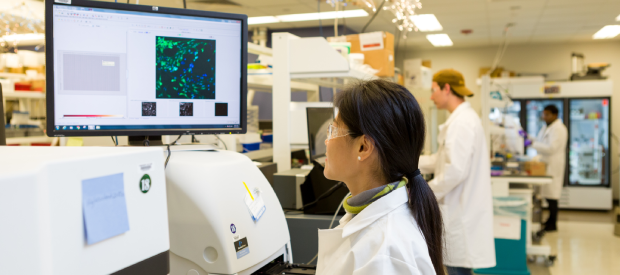NCATS’ Role in the NIH HEAL Initiative
We use translational science to advance new treatments for opioid misuse and addiction and for pain as part of the National Institutes of Health (NIH) Helping to End Addiction Long-term® Initiative, or NIH HEAL Initiative®. This effort is focused on improving prevention and treatment strategies for opioid misuse and addiction, and enhancing pain management.
About Our Role
Contact

With NIH HEAL Initiative support, we provide a suite of translational science resources and expertise to investigators working on opioid and pain research. With its expert collaborative infrastructure already in place, the center is leading NIH-wide collaborative efforts that include:
- Developing new testing platforms that more closely model human biology than currently available cell and animal models, using induced pluripotent stem cells (iPSCs), tissue chips and 3-D tissue bioprinting
- Identifying and de-risking (substantially reducing the risks, time delays and costs of advancing basic research breakthroughs) possible therapies that work in novel ways through assays (tests) and high-throughput screening;to select and develop compounds that show promise as potential drugs
- Accelerating the identification of promising chemical structures and developing those into pharmacological or drug-like compounds
- Advancing promising new drug candidates through rigorous preclinical efficacy and safety studies for first-in-human clinical trials as required by the U.S. Food and Drug Administration
- Facilitating opportunities to partner with other NIH institutes and centers, as well as clinical research institutions nationwide, to conduct studies to determine the effectiveness of existing pain management treatments
Through the NIH HEAL Initiative, we apply the breakthrough approaches of translational science to advance new treatments for the opioid crisis.
HEAL Awards Issued by NCATS
With NIH HEAL Initiative support, we issued awards to investigators working on opioid and pain research. The programs and awards focus on ASPIRE Design Challenges to develop innovative and catalytic approaches toward solving the opioid crisis and tissue chips to model nociception, addiction and overdose.
Read more about the program details and awards.
Using Mouse Pain Scales to Discover Unusual Pain Sensitivity and New Pain Targets
Genetic background plays an important role in how different people feel pain. To understand how genes affect pain, NCATS-funded researchers will study hundreds of mice from different genetic backgrounds. New artificial intelligence methods will be used to analyze the data gathered. The goals of this study are to find new genes involved in pain sensing and to shed light on why some people are more sensitive to pain. In the long term, this research will help in the development of non-addictive pain medications. Learn more about the mouse pain scales project.
Scale Up Single-Cell Technologies to Map Pain-Associated Genes and Cells Across the Life Span
Chronic pain can last for months or years and reduce quality of life. The causes of chronic pain are not well understood. We have funded researchers to decode the genes and cells involved in chronic pain using single-cell -omics technology. Researchers will study these pathways across the life span of mice, including during pregnancy, to discover new biomarkers and treatment targets for chronic pain. Learn more about the pain-associated gene mapping project.
HEAL News

Electronic Consent Summary Form Creates More Participant-Focused Process, Speeds Clinical Trial Enrollment
March 27, 2025 - NCATS News
- Clinical and Translational Science Awards (CTSA) Program
- Helping to End Addiction Long-term® Initiative (HEAL)
- Our Impact on Clinical Trials
An electronic consent summary form used for a clinical trial created a clearer and more efficient process and was well received by participants.
Read ArticleUsing a Pea-Sized Node in the Bain to Potentially Treat Drug Addiction
April 22, 2025 - Grantee/Partner News
- Helping to End Addiction Long-term® Initiative (HEAL)
Electronic Consent Summary Form Creates More Participant-Focused Process, Speeds Clinical Trial Enrollment
March 27, 2025 - NCATS News
- Clinical and Translational Science Awards (CTSA) Program
- Helping to End Addiction Long-term® Initiative (HEAL)
- Our Impact on Clinical Trials
An electronic consent summary form used for a clinical trial created a clearer and more efficient process and was well received by participants.
Bertagnolli Visits Oklahoma to Discuss Research Collaborations
September 13, 2024 - Grantee/Partner News
- Helping to End Addiction Long-term® Initiative (HEAL)
NIH HEAL Initiative

Want to learn more about the NIH HEAL Initiative? Check out their website to read about the latest news, funded projects, and more.
NIH HEAL Initiative Funding Opportunities

Interested in participating in the NIH HEAL Initiative? View all open funding opportunities on the initiative’s website.


